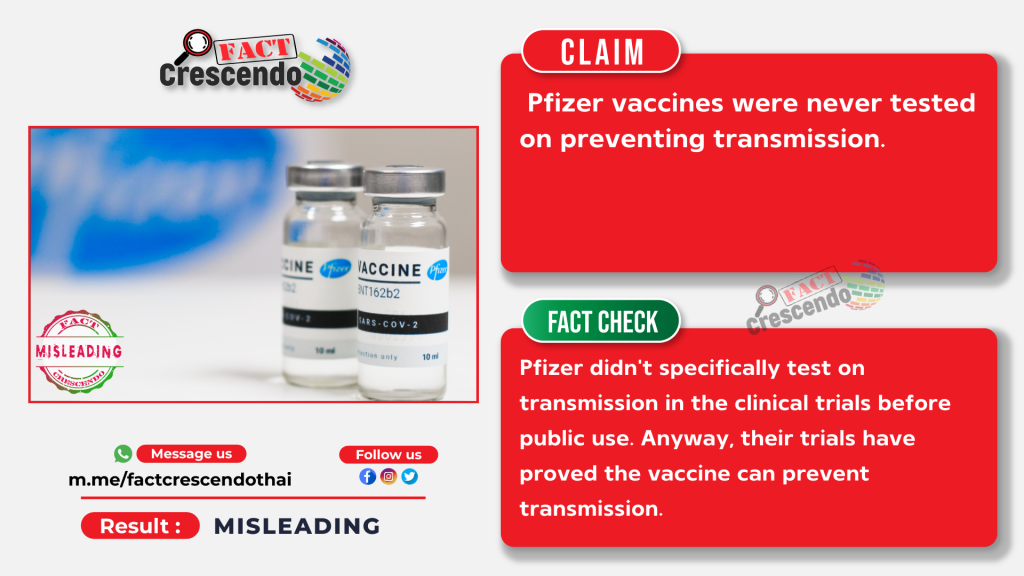
False information about vaccines is a growing problem, especially in the context of the COVID-19 pandemic. Misinformation about vaccines can spread quickly through social media and other channels, leading to confusion and fear among the public. It is crucial to separate fact from fiction to ensure that people make informed decisions about their health and the health of their communities. In the case of COVID-19 vaccines, numerous false claims have been made about their safety, efficacy, and impact on transmission. Here we found another viral claim about the vaccine that might give misconceptions about the vaccine’s efficiency.
Rob Roos, a Member of the European Parliament (MEP), published a tweet suggesting that the Pfizer executive revealed that COVID-19 vaccines were not tested for their effect on transmission and lacked crucial information. He posted a video and said, “BREAKING: In COVID hearing, #Pfizer director admits: #vaccine was never tested on preventing transmission. “Get vaccinated for others” was always a lie. The only purpose of the #COVID passport: forcing people to get vaccinated. The world needs to know. Share this video!”
This tweet went viral with over 150K retweets and over 250K likes.
After investigating this matter, Fact Crescendo found the claim misleading.
Fact-Checking
Rob Roos has posted a video with the above tweet of him asking a question to Janine Small, president of international developed markets at Pfizer, during a 10 October 2022 hearing before the Special Committee on COVID-19 Pandemic.
Rob Roos: Was the Pfizer COVID vaccine tested on stopping the transmission of the virus before it entered the market?”
Janine Small: “Regarding the question around, did we know about stopping immunization before it entered the market … no”.
And in this context, Small likely meant to say “transmission” rather than “immunization,” according to Health Feedback.
Did Pfizer admit they never tested on preventing transmission?
Pfizer did not conduct clinical trials explicitly focusing on the transmission effect, as the clinical trials for the Pfizer-BioNTech COVID-19 vaccine focus on safety and efficacy. Anyway, the Pfizer-BioNTech COVID-19 vaccine’s tests demonstrated that the vaccine could reduce the amount of virus shed by infected individuals, which in turn reduces their ability to transmit the virus to others.
According to NewsWise, Pfizer did not claim to have tested the effectiveness of their COVID-19 vaccine in preventing transmission. This information was clearly stated in press releases by the European Medicines Agency and the published study on Pfizer’s clinical trial results. Furthermore, when the FDA announced the emergency authorization of the Pfizer COVID vaccine in December 2020, they made it clear that there was no evidence to determine how long the vaccine would provide protection or prevent transmission as the clinical trials were designed to evaluate the safety and efficacy of the vaccine in preventing symptomatic disease, not transmission.
Later Studies on Preventing Transmission
While the initial clinical trials for the Pfizer-BioNTech COVID-19 vaccine were focused on testing its safety and efficacy, not its ability to reduce transmission, the later studies found that the vaccine did reduce the likelihood of transmission. A study of more than 23,000 healthcare workers in England, published in April 2021, found that two doses of the vaccine reduced the incidence of new infections by over three times. The number of infections was 14 per 10,000 person-days in the unvaccinated group compared to 4 per 10,000 person-days in the vaccinated group. The study provides evidence of the vaccine’s efficacy in reducing the spread of COVID-19 in real-world settings. Moreover, a New England Journal of Medicine Study published in February 2022 found that vaccinated people were less likely to transmit the virus than unvaccinated people, and the Pfizer-BioNTech vaccine was found to be more effective than the AstraZeneca vaccine in reducing transmission. In addition, another study in Denmark (September 2022) also confirmed that COVID-19 vaccination helped reduce the likelihood of infection and transmission.
Conclusion
The claim that Pfizer vaccines were never tested on preventing transmission is misleading, even though Pfizer didn’t specifically test on transmission in the clinical trials before public use, their trials have proved the vaccine can prevent transmission. Also, later studies found that the vaccine is effective in preventing transmission. Though initial data on transmission was limited, subsequent studies found that the vaccine can reduce transmission. Despite this, the vaccine still provides benefits such as reducing disease severity and hospitalization, and vaccination is recommended to protect both the individual and others.

Title: Viral claim about Pfizer Vaccines Inefficiency in Preventing Transmission is NOT Valid
Fact Check By: Cielito WangResult: Misleading




